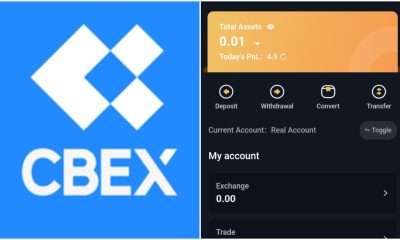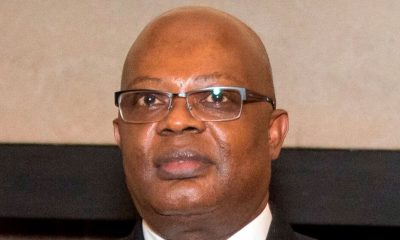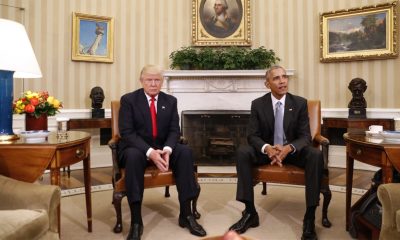Business
World Bank: Nigeria’s unemployment rate rose five-fold in 10 years

The World Bank says the unemployment rate in Nigeria rose five-fold in the last 10 years.
From 6.4 percent in 2010 to 33.3 percent at the end of 2020, the Bank said the significant increase affected Nigerian youth in their quest to find gainful employment opportunities.
In March, the National Bureau of Statistics (NBS) reported that Nigeria’s unemployment rate climbed to 33.3 percent in the fourth quarter (Q4) 2020 from 27.1 recorded in the second quarter (Q2) 2020.
The NBS had said a total of 23.18 million persons in Nigeria either did nothing or worked for less than 20 hours a week, making them unemployed during the fourth quarter (Q4) 2020.
According to StatiSense, a data technology company, with 33.7 percent, Nigeria ranked top among the list of countries with the highest unemployment rate globally.
In its recent report, titled, ‘Of Roads Less Travelled: Assessing the Potential for Migration to Provide Overseas Jobs for Nigeria’s Youth’, the World Bank said the labour market has significantly worsened following the 2016 recession and COVID-19.
The Bank said the acute jobless crises caused socio-economic challenges for the rising working-age population resulting in an increase in the number of citizens seeking asylum and refugee status in other countries.
“The expanding working-age population combined with scarce domestic employment opportunities is creating high rates of unemployment, particularly for Nigeria’s youth,” the report added.
“Since 2018, the active labour force population has dramatically decreased to around 70 million—lower than the level in 2014— while the number of Nigerians in the working-age population but not active in the labour force has increased from 29 million to 52 million between 2014 and 2020.
“Similarly, Nigeria’s active labour force population, that is, those willing and able to work among the working-age population, grew from 73 million in 2014 to 90 million in 2018, adding 17.5 million new entrants to Nigeria’s active labour force.”
The Bank advised Nigerian institutions to promote managed migration approaches that help create opportunities for prospective job seekers to find employment internationally.
It also added that Nigeria to implement and support schemes that increase the returns to human capital investments for youth.
Auto
Easter travels: ABC Transport injects 2025 Toyota Hiace buses into operations

Easter travels: ABC Transport injects 2025 Toyota Hiace buses into operations
Ahead of Easter, ABC Transport Plc has added a fleet of brand new, 2025 model Toyota Hiace buses to its operations.
This, it said in a statement, was a strategic move to enhance customer satisfaction and operational reliability.
It aligns with the company’s mission of providing safer, more reliable, and comfortable travel experiences, particularly during the busy Easter season.
The new vehicles, which are equipped with state-of-the-art GPS trackers and speed limiter devices, are part of ABC Transport’s historic culture of prioritising passenger safety.
These features, which are standard across the company’s entire fleet, allow for real-time monitoring and ensure adherence to safe driving practices.
Apart from the fleet upgrade, ABC Transport recently concluded its quarterly Pre-Peak Season Crew Seminar, aimed at reinforcing the company’s commitment to safety, maintenance, and customer service ethics.
It said the seminar provided a platform to engage all crew members, focusing on best practices in vehicle handling, passenger care, and emergency preparedness.
Speaking on the importance of these initiatives, Managing Director of ABC Transport Plc, Mr. Jude Nneji, said, “Safety and service excellence are at the heart of everything we do at ABC Transport.
“The addition of these modern vehicles, coupled with our crew’s enhanced training, ensures that passengers can travel with peace of mind and enjoy an exceptional travel experience, even during the high-demand Easter season.”
The 2025 Toyota Hiace buses, known for their durability and fuel efficiency, also feature air-conditioned interiors and spacious seating, making them ideal for long-distance travel.
Designed to handle Nigeria’s road conditions, these vehicles further solidify ABC Transport’s reputation as a leader in the intercity transport sector.
Industry analysts view this dual approach—upgrading fleet technology and investing in human capital—as a testament to ABC Transport’s commitment to staying ahead of the curve.
This is also in line with the trend of new fleet injections and investments that have been noticed at ABC Transport since late last year following the acquisition of over 50 heavy duty trucks in their Haulage and Logistics subsidiaries as well as wide adoption of CNG in its Haulage division.
ABC Transport Plc is Nigeria’s foremost provider of intercity and regional transport services, known for its focus on innovation, safety, and customer satisfaction.
It is also the most diversified and only publicly quoted transport company in Nigeria listed on the Nigerian Stock exchange.
Business
Naira rises to N1,618/$ in parallel market

Naira rises to N1,618/$ in parallel market
The naira yesterday appreciated to N1, 618 per dollar in the parallel market from N1,620 per dollar on Monday.
But, the Naira depreciated to N1,604 per dollar in the Nigerian Foreign Exchange Market (NFEM).
READ ALSO:
- I’m capable of becoming Nigeria’s president — Makinde
- Outrage over video of police officers collecting cash from Chinese man
- Nigerians lose N1.3tn as ponzi scheme CBEX collapses
Data published by the Central Bank of Nigeria, CBN, showed that the indicative exchange rate for the naira rose to N1,604 per dollar from N1,599 per dollar on Monday, indicating N5 depreciation for the naira.
Consequently, the margin between the parallel market and NFEM rate narrowed to N14 per dollar from N21 Monday.
Naira rises to N1,618/$ in parallel market
Insurance
Lasaco Assurance Plc attains ISO/IEC 27001:2022 Certification for Information Security Management

Lasaco Assurance Plc attains ISO/IEC 27001:2022 Certification for Information Security Management
Lasaco Assurance Plc, one of the leading insurance companies in Nigeria, is pleased to announce that it has successfully obtained the ISO/IEC 27001:2022 certification, a globally recognized benchmark for Information Security Management Systems (ISMS).
This certification comes after a thorough and detailed re-certification audit, validating its commitment to upholding the highest standards in information security and cybersecurity.
The ISO/IEC 27001:2022 certification highlights Lasaco’s ongoing efforts to protect confidential information, manage risks, and enhance its approach to information security, aligning with global best practices.
Speaking on this new development, the Managing Director, Lasaco Assurance Plc, Mr. Razzaq Abiodun, said, “We are incredibly proud of this achievement, which demonstrates our dedication to maintaining the highest standards of operational excellence and continuous improvement.
READ ALSO:
- Stop promoting risky coins, unlicensed platforms, SEC warns influencers
- Many killed as suspected herdsmen attack Benue community
- Court throws out Femi Falana, Falz’s defamation suit against VeryDarkMan
“In today’s digital age, ensuring the safety and security of sensitive information is of paramount importance, and this certification reaffirms our commitment to being a trusted and responsible organization.”
ISO/IEC 27001:2022 offers a structured framework for managing and securing critical business information, ensuring that all aspects of the organization’s information security are addressed through proactive risk management. This certification affirms Lasaco Assurance’s robust commitment to safeguarding sensitive data against emerging cyber threats.
“Moving forward, we remain dedicated to ensuring the highest level of information security, compliance, and excellence in all our operations,” the Head of IT, Lasaco Assurance, Mr. Dimeji Ogundele said.
The company extends its deepest gratitude to its entire team, clients, and partners whose support was pivotal to achieving this certification. Lasaco Assurance Plc is a composite insurance company, providing a wide range of insurance solutions.
With a rich history of trust, innovation, and customer satisfaction, Lasaco continues to deliver reliable and cutting-edge services to individuals, businesses, and government institutions.
Lasaco Assurance Plc attains ISO/IEC 27001:2022 Certification for Information Security Management
-

 Business2 days ago
Business2 days ago5 facts about trending digital trading platform, CBEX
-

 Education3 days ago
Education3 days agoNELFUND: How schools, banks are ripping off students
-

 metro3 days ago
metro3 days agoRivers administrator demands N300m refund from NBA after relocating conference
-

 Insurance23 hours ago
Insurance23 hours agoLasaco Assurance Plc attains ISO/IEC 27001:2022 Certification for Information Security Management
-

 International2 days ago
International2 days agoObama reacts as Trump freezes $2.3b Harvard University funding
-

 Politics3 days ago
Politics3 days ago2027: PDP governors reject alliance of opposition parties
-

 metro2 days ago
metro2 days agoBREAKING: Court strikes out defection suit against 27 pro-Wike Rivers lawmakers
-

 metro2 days ago
metro2 days agoNatasha’s allegation against Akpabio has contradictions – Agbakoba

